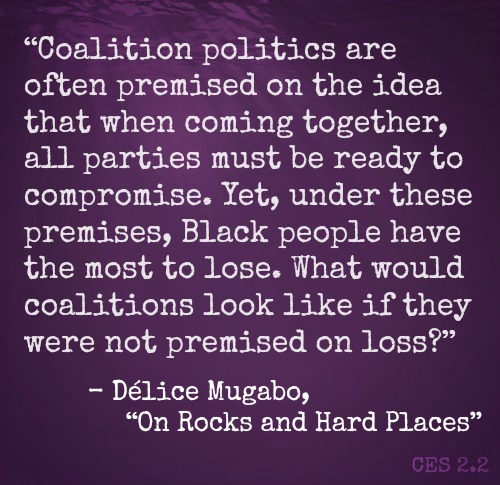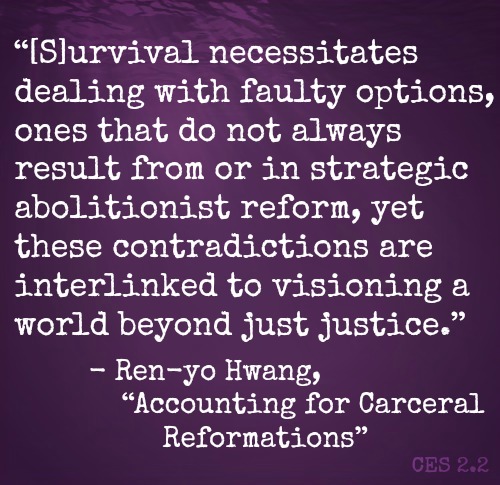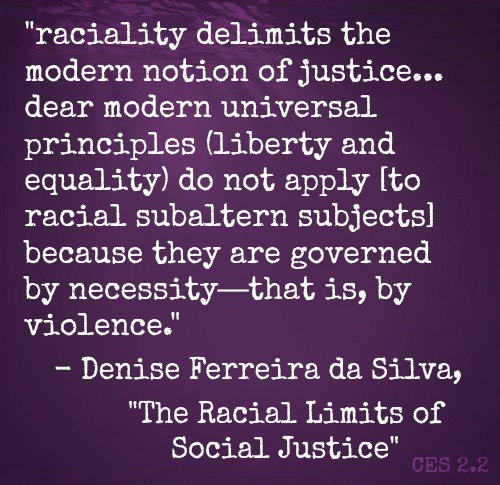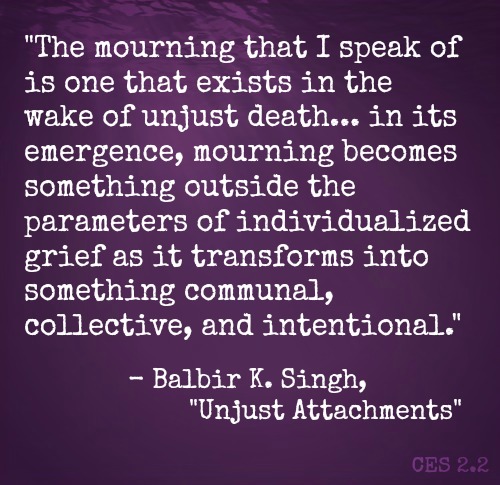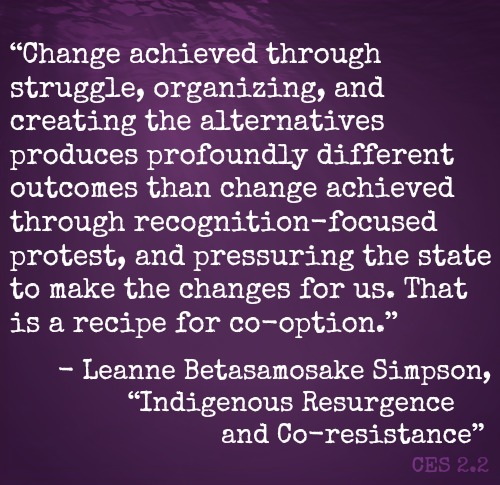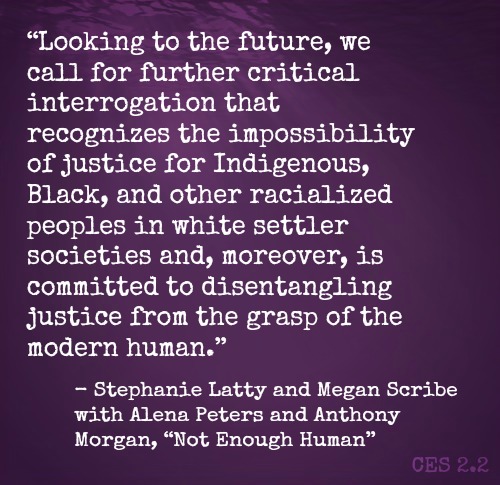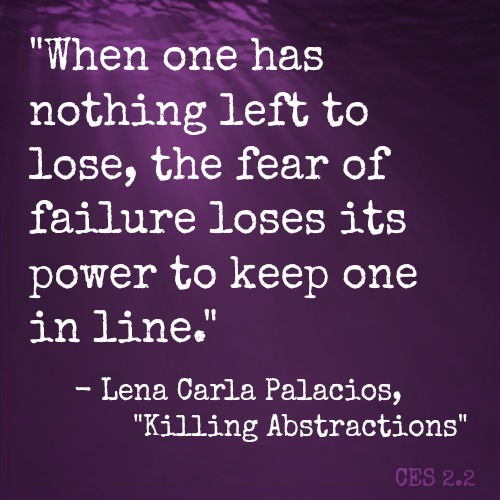New Blog Post: How the Stop Asian Hate Movement Became Entwined with Zionism, Policing, and Counterinsurgency by Dylan Rodríguez
The emergence of the United States-based Stop Asian Hate movement since 2021 has catalyzed various forms of organization and grassroots mobilization, much of which pivots on demands for enhanced policing, expansions of criminal justice and civil rights infrastructures, increased state and private funding, and various forms of state-centered grievance. Stop Asian Hate’s militant, public-facing liberalism has momentarily overshadowed numerous radical projects and networks formed by Asian and Pacific Islander activists in and beyond the U.S., including those engaged in autonomous mutual aid, anti-racist organizing, Black and anticolonial/Palestine solidarity, prisoner support, sex worker solidarity, queer and trans self-determination, and abolitionist community-building. Read full blog post here.
CES ISSUE 8.2 Now Live!
Image by D. Minkler
Guest edited by Crystal Mun-hye Baik and Anjali Nath CES Volume 8, Issue 2 critically examines the entrenched relationship between ethnic studies and militarization. Consisting of four articles, a syllabus, an interview, a book forum, a political document, and a translation project, the rich contributions of this issue engage the ways that militarization is enabled by the voracious hunger of racial capitalism, carceral violence, and settler colonial occupation. They also provide antiracist, antimilitarist, and feminist interventions that demonstrate radical forms of solidarity, and that move us toward a demilitarized future. As shared in the introduction, this volume draws inspiration from established bodies of scholarship that have long articulated the structural relations between militarization and racial capitalism, though not always framed as such—including the writing of Raymond Williams and Ruth Wilson Gilmore. Lastly, given the moment and time of CES 8.2’s publication, the co-editors dedicate this special issue to the Palestinian people: their unity, their dignity, and their struggle for freedom.
Blog post: Recognizing Genocide in Our Classroom by Sophia Azeb
What the last 2 weeks have inexorably demonstrated is that the post-colonialists will not save us.
For myself, it is through Black studies and Black study where the possibilities of our collective liberation can be realised. Black studies is after all a pedagogy of liberation, and public education must be first and foremost in service to the public good. Read the full blog post here.
Blog post: ASA Academic & Community Activism Caucus Statement on Gaza, Palestine, and Israel, the United States and Canada
The genocide underway in Palestine is unbearable, torturous, a hellscape. We are incandescent with rage and pain. In North America, Europe, and Australia, the institutions of civic life – legislators, media, universities, non-profits – have openly declared themselves for the dehumanization of colonized people, and for ethnic cleansing. Read the full statement here.
Blog Post: Why We Withdrew from NWSA’s Annual Meeting? A statement by Feminists for Justice in Palestine
“As the Israel settler colonial genocidal onslaught against Gaza and the rest of Palestine continues, we reaffirm our unwavering solidarity with, and radical anticolonial support for, the Palestinian people and their ongoing resistance.” Read the full statement here.
Blog post: Join Feminists for Justice in/for Palestine to call on NWSA to Honor the Academic Picket Line and Reaffirm its Unwavering Commitment to Palestinian Liberation & Feminism, including BDS.
Read the statement by feminist scholars and activists committed to and under the auspices of Feminists for Justice in/for Palestine (F4JP). The statement is released following a long, difficult and still unresolved process trying to make the National Women’s Studies Association (NWSA) more accountable to F4JP, Palestinians, other Indigenous peoples, and marginalized communities and movements from multiple colonial contexts.
Read it here.
NEW: CALL FOR PAPERS (Now Closed)
Critical Ethnic Studies Issue 9.2: Palestine After Analogy
Iyko Day, Mount Holyoke College and Nasser Abourahme, Bowdoin College
Analogies to South African apartheid, Jim Crow, and the Trail of Tears have served as important entry points for understanding the Palestinian experience and for developing a sense of shared struggle with other colonized and racialized populations. In 2014, as Israeli forces engaged in air strikes over the occupied territories, Black Lives Matter protesters in Ferguson wore Palestinian kaffiyehs, proclaiming “From Ferguson to Palestine, occupation is a crime.” During the 2016 protests against the Dakota Access Pipeline, Palestinian activists expressed solidarity with Native Americans, citing commonality as dispossessed Indigenous people who have “suffered the same fate as your people.”
This special issue of Critical Ethnic Studies responds to the urgency of transnational solidarity movements in support of Palestinian liberation by exploring the possibilities and limits of frameworks grounded in comparison and analogy. Despite the potential for coalitions based around a shared identification of common experiences, Noura Erakat and Marc Lamont Hill warn that “while indispensable, such frameworks are insufficient for developing a critical and nuanced analysis of contemporary Black-Palestinian [and other] solidarity politics.” Extending this point, Karim Kattan has raised issues around the increasing popularity of the phrase “Palestinian Lives Matter,” cautioning that the slogan can function as “a way to dismiss the uniqueness of the threat and violence faced by Black people in the United States.” Despite these warnings, there is no question that analogy has been vital for imagining transnational solidarity in our historical moment. Thus, the “after” in the issue’s title is less a call to move past analogy than an inquiry into the outcomes and impact of analogy.
Leaning into a politics of indeterminacy, this issue builds a critical conversation around transnational solidarity movements related to Palestinian struggle for self-determination, historically and in the contemporary moment. While the issue seeks to decenter the United States, it recognizes that the global visibility of Palestine’s struggle has also relied on US grammars of struggle. It similarly understands that global invocations of “solidarity with Palestine'' may empty out the specificity and meaning of “solidarity.” The issue seeks to imagine frameworks for transnational movement building that account for specificity of Islamophobia, anti-Arab racism, antiblackness, and Indigenous dispossession that animate the ongoing Nakba (catastrophe) in occupied Palestine. We take stock of how Palestine can inform the interdisciplinary field of critical ethnic studies and its commitment to coalitional politics.
Possible essay topics:
Race, Indigeneity, antiblackness in Occupied Palestine
Forging solidarities through performance, art, and dance (Dabkeh)
Ongoing Nakba and ongoing return in relation to questions of Indigeneity
“Palestinian Lives Matter” and comparative approaches to antiblackness
Queer Palestine and global queer politics
Black-Palestinian transnational solidarity
Palestine within the field of settler colonialism
Palestine and comparative partition studies/solidarity politics
Internationalism, transnational solidarity movements
United Nations, US Imperialism, and Israeli militarism
Palestine and the transnational politics of prison abolition
Solidarity movements based on resource extraction and infrastructure
Palestine and theories of racial capitalism
For full consideration, please send 200-300 word abstracts and a condensed CV by July 1, 2023 to iday@mtholyoke.edu (please cc: justice@criticalethnicstudies.org). Full manuscripts will be due for peer review by September 1, 2023, for those invited to submit.
CES Issue 7.2 Now Live!
Cover art by Jane Chang Mi
Issue 7.2, “Center-to-Center Relationalities: At the Nexus of Pacific Islands Studies and Trans-Pacific Studies,” is available digitally now.
This special issue focuses on non-nationalist solidarities and cross-racial alliances committed to demilitarization and decolonization across Asia, the Americas, and Oceania. We spotlight the nexus between Trans-Pacific and Pacific Islands studies, including its tensions and intersections, viewing it as an ideal location from which to conceptualize how to unravel ongoing imperial entanglements that link these geographies. Lisa Yoneyama argues that “an absenting of connections and entanglements . . . risks obscuring dialogues continuing at the intersections of Asian and Asian American studies, critical ethnic studies, [and] Pacific Islander studies,” fields which we observe operating as though they inhabit seemingly distinct orbits, often looking past, opposing, or sidestepping one another. We focus on two factors that contribute to this troubling “absenting of connections”: first, the gaps resulting from organizing areas of study through a discrete and siloed focus on populations (Pacific Islander versus Asian/American) and geographies (the Pacific, Asia) and, second, addressing how Trans-Pacific studies “flies over” Oceania, thus reproducing settler colonial epistemologies by eliding Pacific Islander histories and communities. Impasses and blockages can force the creation of new paths and open in new directions. Instead of rescuing or resolving the tensions between fields, we sought contributions that further disturbed and unsettled established categories, motivated by the desire for dialogues and interventions that reflect the capacious possibilities of critical engagement that open new ground. We feature scholarship that is keenly attendant to the ways that the specificities of a local space are linked to global movements, interlocking systems of domination, and resistance that exceed colonial categories of nation, race, gender, and related groupings.
Guest edited by Jinah Kim and Nitasha Tamar Sharma, this issue features work by Akiemi Glenn, Ryan Buyco, the International Women’s Network Against Militarism, Sam Ikehara, Hi‘ilei Julia Kawehipuaakahaopulani Hobart, Erin Suzuki, Aimee Bahng, Ayano Ginoza, Evyn Lê Espiritu Gandhi, Rebecca H. Hogue, Anaïs Maurer, Kristin Oberiano, Josephine Faith Ong, Juliann Anesi, Alfred P. Flores, Brandon J. Reilly, Christen T. Sasaki, Kēhaulani Vaughn, Joyce Pualani Warren, Ethan Caldwell, Miya Sommers, Jane Komori, Eiichiro Azuma, and Greg Dvorak.
Read it here.
New blog post: Open Letter to Ethnic Studies Scholars: Attacks Against Critical Race Theory and Caste Protections
An open letter to call on other ethnic studies scholars and scholars of race and ethnicity across the nation to recognize the national right-wing efforts to ban the teaching of critical race theory as interconnected with the fight to halt the recognition and teaching of caste.
Read the full post on the blog.
CES Issue 7.1 Now Live!
Cover art by Dylan Miner
Issue 7.1, “Fascisms,” is available digitally now.
Authoritarian political leaders and violent racist nationalist movements are a resurgent feature of the present historical conjuncture. The list is long and threatens to grow: Donald Trump in the United States, Jair Bolsonaro in Brazil, Narendra Modi in India, Rodrigo Duterte in the Philippines, Recep Tayyip Erdoğan in Turkey, and Viktor Orbán in Hungary, to name a few. Responding to the urgency of the current political crisis, this special issue of Critical Ethnic Studies explores what the analytic of fascism offers for understanding this authoritarian convergence by centering the material and speculative labor of antifascist and antiracist social movement coalitions. Featured essays build a critical conversation across multiple world contexts and explore a variety of ways of theorizing what fascism and antifascist movements might mean during the current moment or historically with relevance for the current moment. By emphasizing fascisms plural, this special issue seeks to address two problematics in particular. First, it reckons with the global proliferation of fascist formations within and beyond the US and Europe over the course of the Cold War and into our contemporary political conjuncture. Yet in many respects fascism remains elusive as a political and cultural phenomenon. This special issue examines fascism as a geopolitically diverse series of entanglements with (neo)liberalism, white supremacy, racial capitalism, imperialism, heteropatriarchy, and settler colonialism. Second, the special issue centers the historical, political, and epistemological variety of antifascist collective organizing undertaken by Black, Indigenous, and other racialized subjects across the planet in ways that challenge the usual Eurocentrism through which studies of fascism often proceed. Racialized and colonized peoples have always been at the forefront of theorizing and dismantling fascism, and this issue is intended to be a venue to explore, theorize, and activate this work.
Guest edited by Alyosha Goldstein and Simón Ventura Trujillo, “Fascisms” features work by Manu Karuka, Subin Dennis, “If You Don’t They Will”/Cristien Storm and Kate Boyd, Sónia Vas Borges and Filipa César, Vaughn Rasberry, Nadia Abu El-Haj, Anne Spice, Allan E. S. Lumba, Macarena Gómez-Barris, Johanna Fernández, Nicole Nguyen, Yazan Zahzah, Erin Gray, Linette Park, LaShonda Carter, Bridget R. Cooks, and Kevin Wilson Jr.
Read it here.
CES Issue 6.2 Now Live!
The second open-access issue of Critical Ethnic Studies Journal (6.2) is now live! Read it here: https://manifold.umn.edu/projects/ces-0602
“Borderland Regimes and Resistance in Global Perspective” seeks to conceptualize connections between border regimes around the world. Taking up sites that range from US/Mexico, to the Mediterranean, to Palestine/Israel, and beyond, contributors move past superficial comparisons and think through the circulation of technologies, expertise, policing, and surveillance alongside the circulation of anti-colonial strategies via transnational social movements. By bridging conversations that are typically kept in separate academic silos—for example, critical refugee studies, Asian American studies, Black studies, Native studies, Middle East studies, European critical migration studies, comparative colonial studies—these pieces produce theoretically rigorous and empirically grounded investigations of borders outside of what is typically understood as belonging to the field of border studies. This approach emerges from an understanding that the urgent challenges of our current moment as they relate to borders, migration, and displacement require creative approaches that actively trouble disciplinary boundaries.
The issue features an introduction by guest editors Camilla Hawthorne and Jenny Kelly, and contributions from Nunu Kidane, Gerald Lenoir, Gabe Evans, Nick Mitchell, Taylor Wondergem, Ilaria Giglioli, Josen Masangkay Diaz, Iván Chaar López, Loubna Qutami, Jennifer Mogannam, Leslie Quintanilla, Emily Hue, Davorn Sisavath, Xafsa Ciise, Ampson Hagan, Torin Jones, and Stephanie Malia Hom.
Blog post: A Love Letter to the youth impacted by attacks on Ethnic Studies
The 2020-21 attacks on Ethnic Studies organizers, scholars, educators, and departments who have spoken up against Israel’s settler colonial violence across Historic Palestine--especially in East Jerusalem and Gaza--remind us that Palestine continues to be at the heart of what ethnic studies fights for. We know that you will continue to advocate for truth and with dignity for the struggle of the Palestinian people and for the principles of ethnic studies. And in spite of the ongoing effects by Zionists to silence histories that call out injustice, white supremacy, settler colonialism, militarized and violence, we affirm our commitment--now more than ever--to Palestine, the Palestinian people, and indigenous sovereignty and racial justice everywhere.
(See the full CES journal Love Letter on our blog.)
CRES and CES Journal Statement of Solidarity with the Palestinian People on Nakba Day
As a program and journal committed to the study of colonialism, military occupation, and Indigenous resistance, Critical Race and Ethnic Studies stands in support of the Palestinian people as they live under multiple forms of violence imposed on them by Israel. As an academic program housed on Turtle Island, we oppose settler colonialism everywhere and we condemn the land expropriation and settler colonial violence Palestinians have experienced for more than seven decades; we also note that this violence is facilitated by unwavering U.S. financial, military, and political support, which we vehemently oppose.
(See the full CRES and CES journal Statement of Solidarity on our blog.)
About Critical Ethnic Studies
Critical Ethnic Studies provides a space for unique and insurgent critique among academic and activist intellectuals within ethnic studies. It invites interdisciplinary works that reposition the guiding assumptions of other fields, and engage the new methodologies, philosophies, and propositions of this emerging intellectual formation. It recognizes that distinct fields have been collapsed in the institutionalization of Ethnic Studies in universities, and presses back against equivocations which domesticate critique and action.
The Journal encourages and enacts several related, multilayered lines of inquiry. First, this journal questions the nation state model, paying attention to the present manifestations of colonialism, extra-national effects of globalization and privatization, as well as structural redevelopment programs on Indigenous people and people of color.
Excerpts past issues of Critical Ethnic Studies. For more info see our Current Issue page.
Second, this journal appraises the productive tensions between fields that have institutionalized together under the umbrella of Ethnic Studies. Particularly, Indigenous Studies has attended to ongoing settler colonialism and ongoing Indigenous resistance to occupation and erasure, whereas Ethnic Studies has often been vexed by the ways in which discussions of race, civil rights, immigration, labor exploitation, and inclusion may ignore settler colonialism.
Third, by explicitly foregrounding white supremacy as a logic and social formation intimately abetted by race and racism, the journal provide trenchant critiques of how and why race, racism, and antiblackness persist and not merely state or describe their persistence.
Fourth, the journal reflects intersectional, feminist and queer analyses that treats categories such as race, class, gender, and sexuality not as additive modes of identity, oppression, or discrimination--but rather as constitutive, as robust analytics for critically apprehending and theorizing alternatives.




